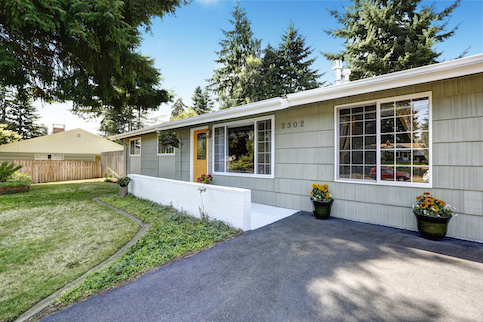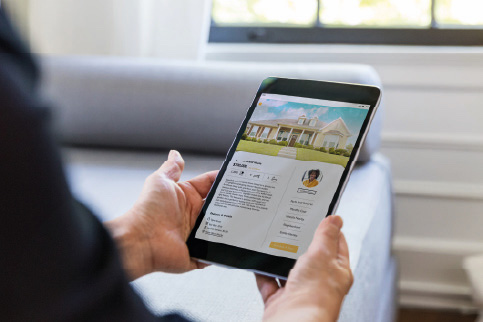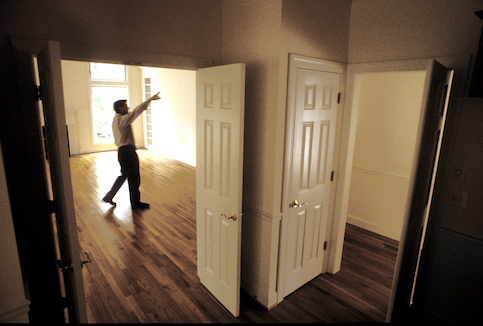

Buying a home is a significant financial undertaking. As a result, some potential home buyers need to ease into homeownership instead of diving right in. A lease purchase agreement or a rent-to-own contract lets a potential buyer rent a property with the intent to purchase it when the lease period is up. In addition, a lease to purchase agreement can help buyers who are struggling to qualify for a mortgage or need a little bit more time to beef up their down payment.
With this in mind, let’s explore the purpose of this legally binding rental agreement and what’s at risk, as well as the benefits of entering into one.
A lease purchase agreement, also called a rent-to-own agreement, is a contract between a renter and a landlord. This agreement allows a renter to lease a property for a period of time before purchasing when the lease agreement expires. The renter typically pays an option fee for the right to buy the property later.
In the lease purchase agreement, both parties agree to what the purchase price will be and the length of the lease term. The contract will also outline the percentage of the rent that will go toward the renter’s down payment. Typically, landlords charge rent above market value so that a portion of the monthly rent can aid the renter’s down payment when purchasing the property later on.
In addition to agreeing to buy the property, the renter must qualify for a mortgage at the end of the lease term. Unfortunately, they lose the right to buy the property if they cannot receive mortgage approval from a lender.
See what you qualify for.
While a lease purchase agreement and lease option agreement seem the same, this is not the case. Both agreements are similar in that they include a lease contract and an option fee and disallow the owner from selling the home to anyone else during the lease period. But the critical difference between the two is the purchase portion of each agreement.
With a lease purchase agreement, the buyer is expected to buy the property once the lease expires. In other words, the sale of the property is set in stone unless either party breaches the terms of the contract. At the same time, a lease option agreement gives the buyer the option to purchase the property at the end of the lease period, but they are not legally obligated to do so.
A lease purchase agreement may be suitable for those looking to become homeowners soon but don’t have their finances ready to buy a house immediately. Some other situations that make sense for a lease agreement include:
A lease purchase agreement is usually two contracts combined: a lease agreement and a contract of sale. The lease agreement potion outlines the lease terms and conditions, whereas the contract of sale outlines the sale terms once the lease expires.
Here are some of the components and terms you can expect to find in both.
Like with standard lease agreements, the first order of business is to determine the lease length and rent price. Therefore, the buyer and owner must identify a term length that benefits both parties.
For example, if the buyer needs time to increase their credit score or lower their debt-to-income (DTI) ratio, a longer agreement may be beneficial. Typically, lease agreements should not surpass 3 years.
The contract of sale is the portion of the agreement that outlines the terms and purchase price of the home after the lease expires. While the purchase price is usually higher than fair market value to account for the appreciation of the property, both the buyer and owner must agree on a price they are comfortable with. Therefore, even if the market fluctuates, the purchase price in the contract will not vary.
The buyer and seller will also agree on an option fee, which gives the renter the right to buy the home at the end of the lease. The option is usually nonrefundable. So, if the renter breaks the contract, the seller can pocket the option fee.
A security deposit is a sum of money the buyer pays before moving into the rental property. This sum could be used to pay for repairs if the tenant damaged the property during their lease agreement. The security deposit guarantees that if the lease agreement falls through, the owner will have the cash to pay for repairs if the tenant damages the property beyond the typical wear and tear of renting.
The individual responsible for paying maintenance fees, homeowners insurance and property taxes should be detailed in a lease purchase agreement. Typically, the tenant is responsible for these payments.
Sellers may include a clause in the lease agreement that allows a percentage of monthly rent payments to go toward building equity in the home. For this clause to apply, a specific percentage of rent must be outlined in the agreement.
The tenant is typically responsible for home maintenance expenses such as repairs. Buyers and owners usually consider this a fair arrangement since the buyer will eventually own the property. But, the specifications of the financial responsibilities of home repairs should be outlined in the lease agreement.
The lease to purchase agreement and the contract of sale usually include cross-default provisions, making specific clauses mutually exclusive. So, if either party violates a provision in the lease agreement, like defaulting on rent payments, it can automatically void the contract of sale.
Additionally, the buyer must qualify for financing by the end of the lease term. If they cannot qualify for a mortgage, they may forfeit the sale portion of the contract.
Buyers and owners can both benefit from a lease purchase agreement. However, like with any contract, there is a level of risk each party should be aware of.
Owners can benefit from a rent-to-own agreement in the following ways:
First-time homebuyers and renters may find a lease to buy agreement appealing for a variety of reasons including:
A lease purchase agreement is a contract between a renter and owner that gives the renter the right to buy the home after the lease is up. The agreement is advantageous because it gives a renter more time to prepare financially for buying a home.
But, remember, how you buy a home depends on your unique financial situation and what works best for your needs. Therefore, exploring all options before entering a lease-to-purchase agreement is wise.












LMB Mortgage Services, Inc., (dba Quicken Loans), is not acting as a lender or broker. The information provided by you to Quicken Loans is not an application for a mortgage loan, nor is it used to pre-qualify you with any lender. If you are contacted by a lender or broker advertising within our network, your quoted rate may be higher depending on your property location, credit score, loan-to-value ratio, debt-to-income ratio, and/or other factors. Quicken Loans does not offer its matching services in all states. This loan may not be available for all credit types, and not all service providers in the Quicken Loans network offer this or other products with interest-only options. The information that we provide is from companies which Quicken Loans and its partners may receive compensation. This compensation may influence the selection, appearance, and order of appearance on this site. The information provided by Quicken Loans does not include all financial services companies or all of their available product and service offerings. Article content appears via license from original author or content owner, including Rocket Mortgage.
Note: Actions on this website are recorded for quality assurance or training purposes. Input of data constitutes consent.
Quicken Loans is a registered trademark of Rocket Mortgage, LLC, used under license by LMB Mortgage Services, Inc.
LMB Mortgage Services, Inc. | NMLS #167283
4859 W Slauson Ave #405 Los Angeles, CA 90056